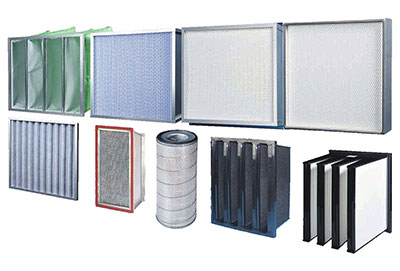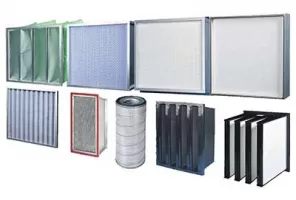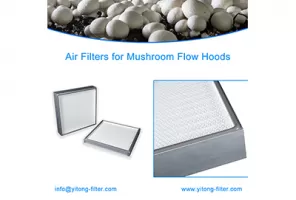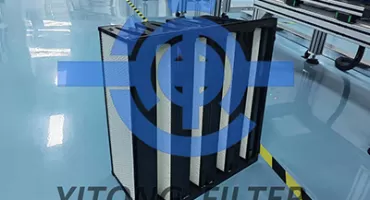 December 03, 2024
December 03, 2024
Maintaining high air quality in industrial environments is far more than a matter of comfort; it’s a necessity for ensuring safety, efficiency, and regulatory compliance. Industrial operations often involve processes that release particulate matter, fumes, and other contaminants into the air. These pollutants can harm workers' health, damage equipment, and lead to non-compliance with air quality regulations.
Ventilation air filters are the frontline defense against such challenges. This comprehensive guide will explain the types of filters available, the considerations for choosing the right filter, best maintenance practices, and the benefits of investing in high-quality solutions for industrial applications.

Industrial facilities, whether in manufacturing, chemical processing, or heavy industries, generate a wide range of airborne contaminants. These can include:
- Dust and Debris: From grinding, cutting, or other material processing tasks.
- Harmful Chemicals: Released during production or cleaning processes.
- Fine Particulates: Tiny particles that are invisible to the naked eye but can cause respiratory issues over time.
1. Protecting Machinery and Equipment
Airborne particles can infiltrate machinery, leading to wear, malfunctions, and reduced operational lifespan. Effective filtration minimizes the risk of costly downtime and repairs.
2. Ensuring Worker Health and Safety
Prolonged exposure to poor air quality can cause respiratory illnesses, allergies, and even chronic conditions. Filters help reduce these risks, fostering a healthier work environment.
3. Meeting Regulatory Standards
Agencies such as OSHA and the EPA enforce stringent air quality standards for industrial settings. Proper ventilation filters help companies comply, avoiding penalties and ensuring safer operations.
Understanding the different filter types and their applications is critical for selecting the right solution.
1. HEPA Filters (High-Efficiency Particulate Air)
- Features: Removes 99.97% of particles as small as 0.3 microns, including allergens, dust, and some airborne pathogens.
- Best For: Industries requiring ultra-clean environments, such as pharmaceuticals, electronics manufacturing, and healthcare facilities.
- Limitation: Higher cost and resistance to airflow, requiring powerful HVAC systems.
2. MERV-Rated Filters (Minimum Efficiency Reporting Value)
- Features: Offers a range of filtration efficiencies, typically from MERV 8 (basic filtration) to MERV 16 (near HEPA-level performance).
- Best For: General industrial applications where balancing cost and efficiency is key.
- Limitation: May require regular replacement in high-contaminant environments.
- Features: Uses carbon to adsorb odors, chemicals, and gaseous pollutants.
- Best For: Facilities dealing with hazardous fumes, such as chemical plants or painting operations.
- Limitation: Focused primarily on gaseous contaminants, with limited particulate filtration.
4. Electrostatic Filters
- Features: Generates static electricity to attract and capture dust and smoke particles.
- Best For: Settings with fine particulates, such as woodworking or welding shops.
- Limitation: Requires regular cleaning to maintain effectiveness.
- Features: Designed to withstand extreme heat without degrading.
- Best For: Industrial furnaces, kilns, and other high-temperature processes.
- Limitation: More expensive than standard filters.
6. Bag Filters:
- Structure: These filters consist of fabric bags that trap particles as air passes through.
- Applications: Commonly used in large HVAC systems and industrial ventilation units, bag filters handle high volumes of air and can capture a significant amount of dust and debris.
Choosing the right filter for your facility involves evaluating multiple factors:
1. Air Quality Needs
- Identify the specific pollutants present in your environment. For example, chemical plants may prioritize activated carbon filters, while textile factories may focus on dust removal.
2. Filtration Efficiency vs. Airflow
- Higher-efficiency filters like HEPA provide superior filtration but may restrict airflow. Choose a filter that balances filtration needs with the operational demands of your HVAC system.
3. Durability and Maintenance
- Industrial settings often require robust filters that can handle heavy use without frequent replacements. Filters with longer lifespans and low maintenance needs reduce downtime and operational costs.
4. Compliance with Standards
- Ensure the chosen filters meet industry-specific regulations and safety standards to avoid penalties and operational disruptions.
5. Environmental Conditions
- Consider factors such as humidity, temperature, and chemical exposure. Filters for high-moisture or corrosive environments must be specially designed to withstand such conditions.
Even the best filters require proper care to function effectively. Neglecting maintenance can lead to reduced air quality, increased energy consumption, and equipment strain.
1. Routine Inspections
- Regularly inspect filters for dirt, damage, or clogs. Include pressure drop monitoring in your maintenance schedule, as increased resistance indicates the need for cleaning or replacement.
2. Timely Replacements
- Follow the manufacturer’s recommended replacement schedule. Overused filters lose efficiency and can even become a source of contamination.
3. Cleaning Procedures
- For reusable filters like electrostatic models, ensure proper cleaning with suitable methods to maintain their performance.
4. HVAC System Checks
- Filters are only as effective as the system they’re part of. Keep ducts, fans, and other components in good condition to support optimal airflow.
Investing in superior ventilation filters offers both immediate and long-term advantages:
- Improved Equipment Longevity
Reduced contamination minimizes wear and tear on sensitive machinery, extending its operational life.
- Enhanced Worker Productivity
Cleaner air environments lead to fewer health issues and higher employee morale.
- Lower Energy Costs
Efficient filters maintain optimal airflow, reducing the energy needed to power HVAC systems.
- Regulatory Peace of Mind
Compliance with air quality standards becomes simpler, reducing the risk of legal or financial repercussions.
Ventilation air filters are an essential component of industrial operations, ensuring clean air, protecting equipment, and supporting regulatory compliance. By carefully selecting the right filter for your needs and maintaining it properly, you can create a safer, more efficient, and more sustainable workplace.
For expert guidance on choosing and maintaining ventilation air filters for your industrial application,get in touch with our team today. We’re here to help you find the best solutions tailored to your unique requirements.
 Dec. 18, 2024
Industrial Air Filters: A Comprehensive Analysis of Their Functions and Applications
Dec. 18, 2024
Industrial Air Filters: A Comprehensive Analysis of Their Functions and Applications
 Jul. 19, 2024
The Importance of Air Filters for Mushroom Flow Hoods
Jul. 19, 2024
The Importance of Air Filters for Mushroom Flow Hoods
 Oct. 12, 2023
H10 V-Bank Type HEPA Filter
Oct. 12, 2023
H10 V-Bank Type HEPA Filter